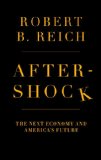 I picked Robert B. Reich’s Aftershock because lately I’ve been wanting to read Reich and because I thought it might make a good follow-up to Krugman’s Depression Economics. This time the criteria were good. The book explains The Great Depression, The Great Prosperity (1947-1975), the bad years since 1975, the recent Global Financial Crisis, and what’s likely to happen next. His main point is that the steps which were taken after World War II which led to and maintained The Great Prosperity are not being taken now (and have not been for several decades), and that we are at risk because of this.
I picked Robert B. Reich’s Aftershock because lately I’ve been wanting to read Reich and because I thought it might make a good follow-up to Krugman’s Depression Economics. This time the criteria were good. The book explains The Great Depression, The Great Prosperity (1947-1975), the bad years since 1975, the recent Global Financial Crisis, and what’s likely to happen next. His main point is that the steps which were taken after World War II which led to and maintained The Great Prosperity are not being taken now (and have not been for several decades), and that we are at risk because of this.
Reich says that the main cause of The Great Prosperity was that the middle class shared in the economic success of the nation, and that the increase of wealth was not allowed to only occur with the upper class. When The Great Prosperity ended in the mid-70’s, the middle class had three coping mechanisms: women entering the work force, everyone working longer hours, and finally increasing consumer debt to finance….consumerism. The three coping mechanisms are now exhausted and Reich says that the inability of the middle class to cope with lower real wages with any of these mechanisms was part of the run-up to the Global Financial Crisis.
He also points out that both The Great Depression and the recent Global Financial Crisis were predicated by huge concentrations of wealth (and thus political power) in the extreme upper class. The aftershock of his title is the terrible scenario he describes wherein the US falls into an economic doldrums worse than (and different from) the Great Depression, if……we don’t re-instate the Basic Bargain (sharing the increased wealth with the middle class, so that they can grow and so that they can buy more). Reich then describes a second scenario (filled with Hazlitt-adverse government interventions, FYI) which might allow us to avoid the aftershock, or at least smooth it out a bit. It’s a short book, but an interesting argument, one which I’ll probably have to counter with a non-Keynesian or more right-wing author somewhere down the line. In terms of technical economics jargon, the book is accessible to the lay reader (me).
I liked the book (it was well-written, scary, and not too complex) , but you may prefer to watch Reich give a lecture/pitch on the topic here, or read the New York Times review, or read this interesting critique first.

Leave a Reply